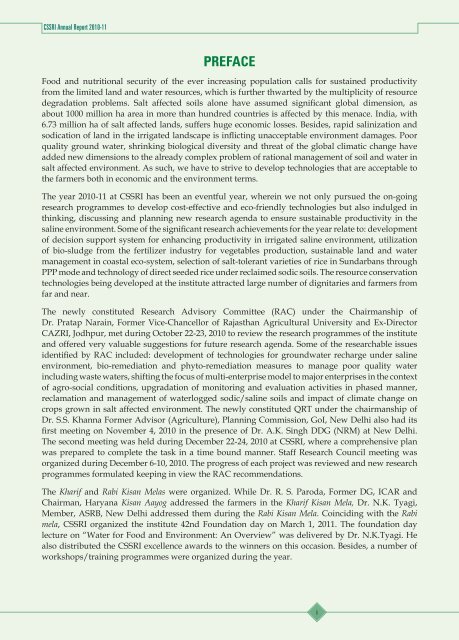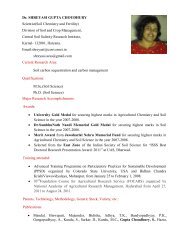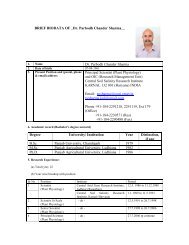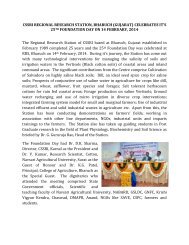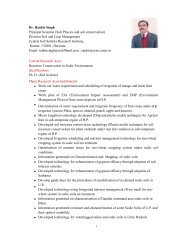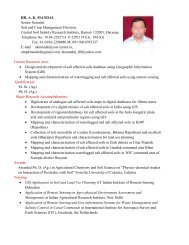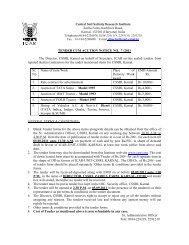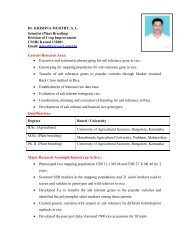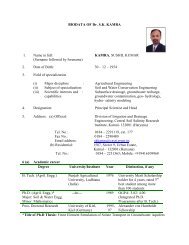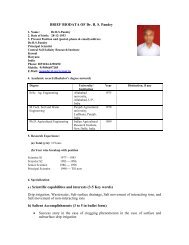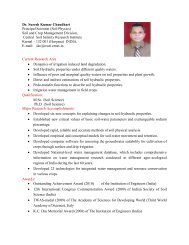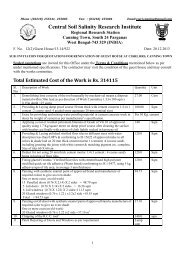CSSRI Annual Report 2010-11 - Central Soil Salinity Research ...
CSSRI Annual Report 2010-11 - Central Soil Salinity Research ...
CSSRI Annual Report 2010-11 - Central Soil Salinity Research ...
Create successful ePaper yourself
Turn your PDF publications into a flip-book with our unique Google optimized e-Paper software.
<strong>CSSRI</strong> <strong>Annual</strong> <strong>Report</strong> <strong>2010</strong>-<strong>11</strong><br />
PREFACE<br />
Food and nutritional security of the ever increasing population calls for sustained productivity<br />
from the limited land and water resources, which is further thwarted by the multiplicity of resource<br />
degradation problems. Salt affected soils alone have assumed significant global dimension, as<br />
about 1000 million ha area in more than hundred countries is affected by this menace. India, with<br />
6.73 million ha of salt affected lands, suffers huge economic losses. Besides, rapid salinization and<br />
sodication of land in the irrigated landscape is inflicting unacceptable environment damages. Poor<br />
quality ground water, shrinking biological diversity and threat of the global climatic change have<br />
added new dimensions to the already complex problem of rational management of soil and water in<br />
salt affected environment. As such, we have to strive to develop technologies that are acceptable to<br />
the farmers both in economic and the environment terms.<br />
The year <strong>2010</strong>-<strong>11</strong> at <strong>CSSRI</strong> has been an eventful year, wherein we not only pursued the on-going<br />
research programmes to develop cost-effective and eco-friendly technologies but also indulged in<br />
thinking, discussing and planning new research agenda to ensure sustainable productivity in the<br />
saline environment. Some of the significant research achievements for the year relate to: development<br />
of decision support system for enhancing productivity in irrigated saline environment, utilization<br />
of bio-sludge from the fertilizer industry for vegetables production, sustainable land and water<br />
management in coastal eco-system, selection of salt-tolerant varieties of rice in Sundarbans through<br />
PPP mode and technology of direct seeded rice under reclaimed sodic soils. The resource conservation<br />
technologies being developed at the institute attracted large number of dignitaries and farmers from<br />
far and near.<br />
The newly constituted <strong>Research</strong> Advisory Committee (RAC) under the Chairmanship of<br />
Dr. Pratap Narain, Former Vice-Chancellor of Rajasthan Agricultural University and Ex-Director<br />
CAZRI, Jodhpur, met during October 22-23, <strong>2010</strong> to review the research programmes of the institute<br />
and offered very valuable suggestions for future research agenda. Some of the researchable issues<br />
identified by RAC included: development of technologies for groundwater recharge under saline<br />
environment, bio-remediation and phyto-remediation measures to manage poor quality water<br />
including waste waters, shifting the focus of multi-enterprise model to major enterprises in the context<br />
of agro-social conditions, upgradation of monitoring and evaluation activities in phased manner,<br />
reclamation and management of waterlogged sodic/saline soils and impact of climate change on<br />
crops grown in salt affected environment. The newly constituted QRT under the chairmanship of<br />
Dr. S.S. Khanna Former Advisor (Agriculture), Planning Commission, GoI, New Delhi also had its<br />
first meeting on November 4, <strong>2010</strong> in the presence of Dr. A.K. Singh DDG (NRM) at New Delhi.<br />
The second meeting was held during December 22-24, <strong>2010</strong> at <strong>CSSRI</strong>, where a comprehensive plan<br />
was prepared to complete the task in a time bound manner. Staff <strong>Research</strong> Council meeting was<br />
organized during December 6-10, <strong>2010</strong>. The progress of each project was reviewed and new research<br />
programmes formulated keeping in view the RAC recommendations.<br />
The Kharif and Rabi Kisan Melas were organized. While Dr. R. S. Paroda, Former DG, ICAR and<br />
Chairman, Haryana Kisan Aayog addressed the farmers in the Kharif Kisan Mela, Dr. N.K. Tyagi,<br />
Member, ASRB, New Delhi addressed them during the Rabi Kisan Mela. Coinciding with the Rabi<br />
mela, <strong>CSSRI</strong> organized the institute 42nd Foundation day on March 1, 20<strong>11</strong>. The foundation day<br />
lecture on “Water for Food and Environment: An Overview” was delivered by Dr. N.K.Tyagi. He<br />
also distributed the <strong>CSSRI</strong> excellence awards to the winners on this occasion. Besides, a number of<br />
workshops/training programmes were organized during the year.<br />
i


